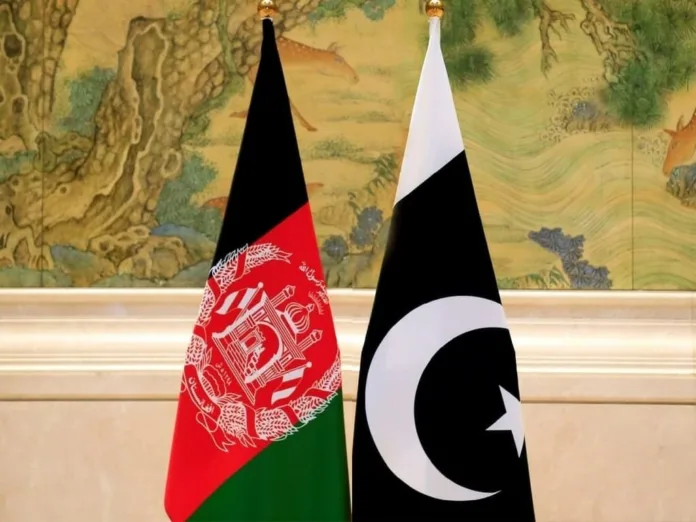✍ Center for Strategic and Regional Studies (CSRS)-Afghanistan
The closure of the Torkham crossing has significantly affected economic ties between Afghanistan and Pakistan, particularly in three key areas: bilateral trade, transit trade, and financial losses.
-
Negative Impact on Bilateral Trade
The closure of Torkham has had a direct negative effect on trade between the two countries. Crossing closures and increasing tensions not only cause financial losses but also disrupt trade flows. A comparison of trade volumes from the early years of the Islamic Emirate’s rule to 2024 shows a clear decline, largely due to growing Torkham and Spin Boldak disputes in 2023, which continued to impact trade in 2024. Many traders have sought alternative routes or reduced their business activities due to the risk of financial loss.
In 2022 (1401 in the Islamic calendar), the total trade volume between Afghanistan and Pakistan was $2.34 billion. This increased slightly to $2.5 billion in 2023 (1402). However, in 2024 (1403), reports from Pakistan’s Ministry of Foreign Affairs indicate that trade dropped sharply to $1.6 billion, with the extended closure of Torkham now lasting around 20 days being a major contributing factor. If this trend continues, bilateral trade could decline even further in 2025.
-
Impact on Transit Trade
In 2010, Afghanistan and Pakistan signed the Afghanistan-Pakistan Transit Trade Agreement (APTTA), a 58-article agreement allowing both countries access to each other’s territory for transit trade. Under this agreement:
Afghanistan has transit access to three major Pakistani ports (Karachi, Gwadar, and Qasim) and trade routes to China (via Sust/Tashkurgan) and India (via the Wagah border).
Pakistan can use Afghan territory to reach Iran (via Islam Qala and Zaranj), Uzbekistan (via Hairatan), Tajikistan (via Sher Khan), and Turkmenistan (via Aqina and Torghundi).
In practice, Afghanistan primarily relies on Torkham to access Karachi and Gwadar, while Pakistan depends on the same route for trade with Central Asia. Therefore, any prolonged closure of Torkham or increased tensions along this route severely disrupts transit trade and negatively impacts the economic relationship between the two countries.
-
Financial Losses
The closure of Torkham Gate has caused significant financial losses for traders on both sides. In 2023, Sayed Zia-ul-Haq Sardar, head of the Pakistan-Afghanistan Joint Chamber of Commerce and Industry, reported that 6,000 trucks were stranded on both sides of the Crossings, leading to millions of dollars in losses.
More recent estimates further highlight the scale of economic damage. According to Yousaf Afridi, president of the Khyber Pakhtunkhwa Chamber of Commerce, as of February 21, 2025, Pakistan has lost nearly $15 million due to the Torkham Gate closure. Similarly, Shakerullah Safi, executive director of the Nangarhar Chamber of Commerce, stated that Afghan traders are losing $500,000 per day. Over the past 20 days, Afghanistan has suffered approximately $10 million in losses, bringing the total financial damage for both sides to $25 million.
Such significant economic losses could severely strain Afghanistan-Pakistan economic relations, making future cooperation more difficult.
Conclusion
The Torkham Gate serves as a strategic and vital route for both Pakistan and Afghanistan. It holds significant importance for transit, trade, and customs revenue for both nations. However, due to security concerns, the construction of military installations, and occasional pressure from the Pakistani government, the Torkham Gate has been closed. This closure has resulted in significant human and financial losses for both sides. In the past 20 days alone, the Pakistani side has suffered an estimated loss of $15 million, while the Afghan side has faced a loss of nearly $10 million. Beyond the financial impact, such incidents at the Torkham Gate have strained the political relations between the two countries. Deteriorating relations with a neighboring country inevitably have negative consequences on the security and economic stability of both nations. As a well-established principle in international relations states: “You cannot change your geography or that of your neighbor, but you can change your policies and interactions to build better relations with them.”
In summary, the closure of the Torkham Gate is not in the interest of either side. Although a recent tribal jirga (council) was held between the two parties, resulting in a ceasefire, no decision has been made yet to reopen the gate.
Recommendations
- Strengthening Political Relations: Afghanistan should work to strengthen its political ties with Pakistan, a key neighbor, in line with its national interests. The security and stability of both countries depend on maintaining good and cooperative political relations.
- Mutual Stability and Trust: The Afghan government should convince Pakistan that a stable Afghanistan is in the interest of both nations. Afghanistan must assure Pakistan that its territory will never be used against Pakistan, and Pakistan, in turn, should avoid using Afghanistan as a ground for competition with India.
- Immediate Reopening of the Gate: Both sides should prioritize reopening the Torkham Gate to restore transit and trade. This will prevent further economic losses and allow stranded travelers to return to their homes.
- Support for Local Communities: The Pashtun tribes residing on both sides of the Torkham Gate rely on it for trade and livelihoods. Both governments should work together to resolve the issues at the gate, ensuring that these communities can continue their economic activities and have their concerns addressed.
